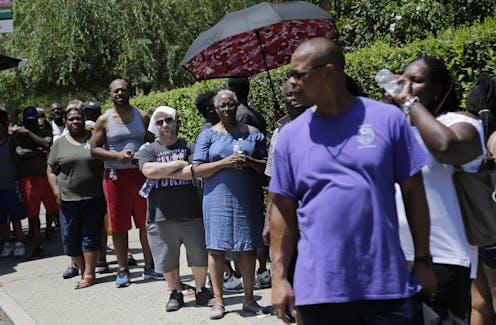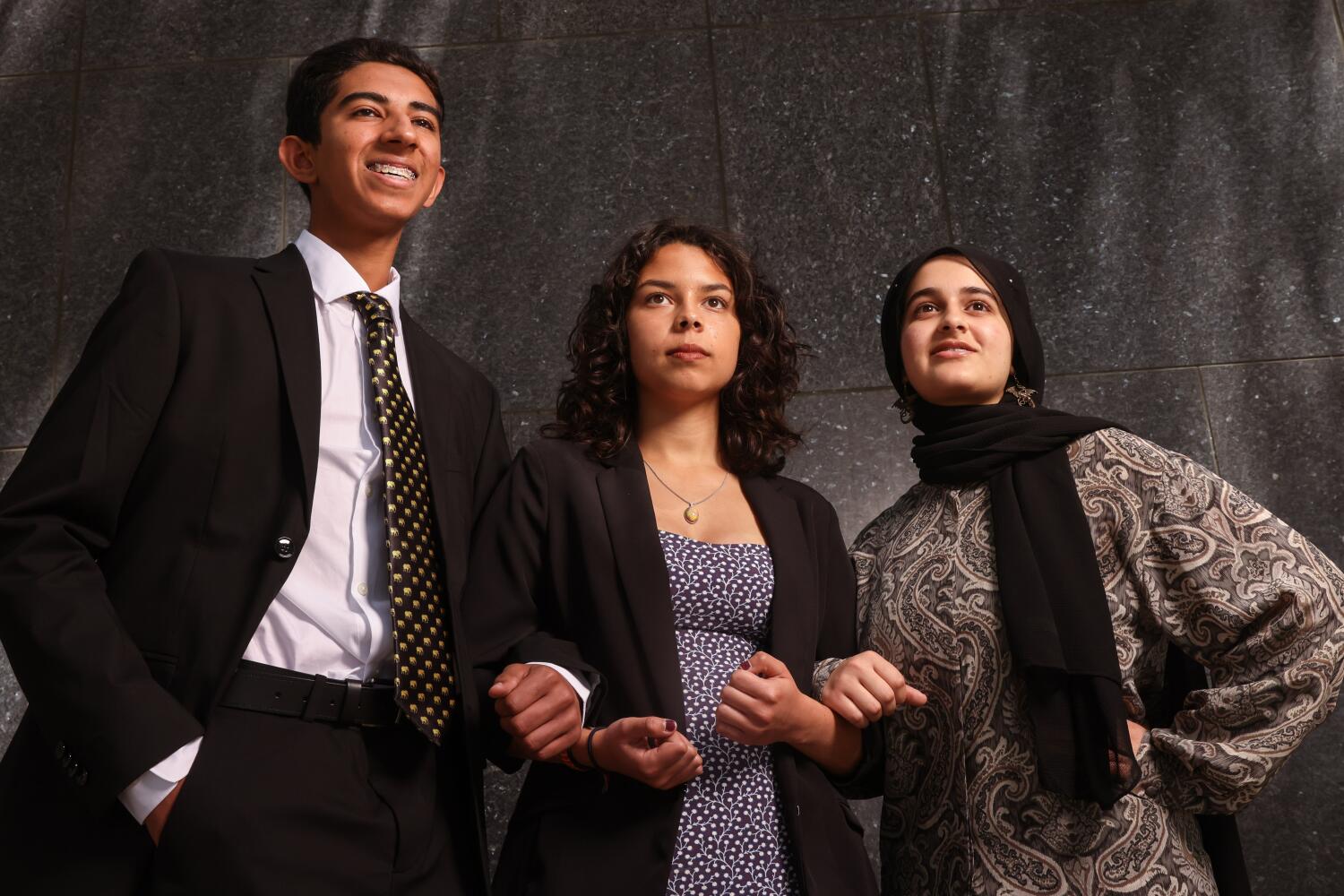This April, representatives from more than 170 global governments will come together in Ottawa, Canada to negotiate a UN global Plastics Treaty – a once-in-a-generation opportunity to begin to solve the plastic pollution crisis. As the fourth of five rounds of talks, the stakes are high: what happens in Ottawa could determine whether the Plastics Treaty succeeds or fails.
World leaders must send a signal to their delegations that not only ambition but courage must be presented at the negotiation table. Plastic is at the centre of the triple planetary crises (climate change, biodiversity loss, pollution) venn diagram. Bold action can help curb all three, or business as usual can continue to fuel them. And Greenpeace is working with our allies to ensure global governments are clear on what bold action looks like in the treaty.
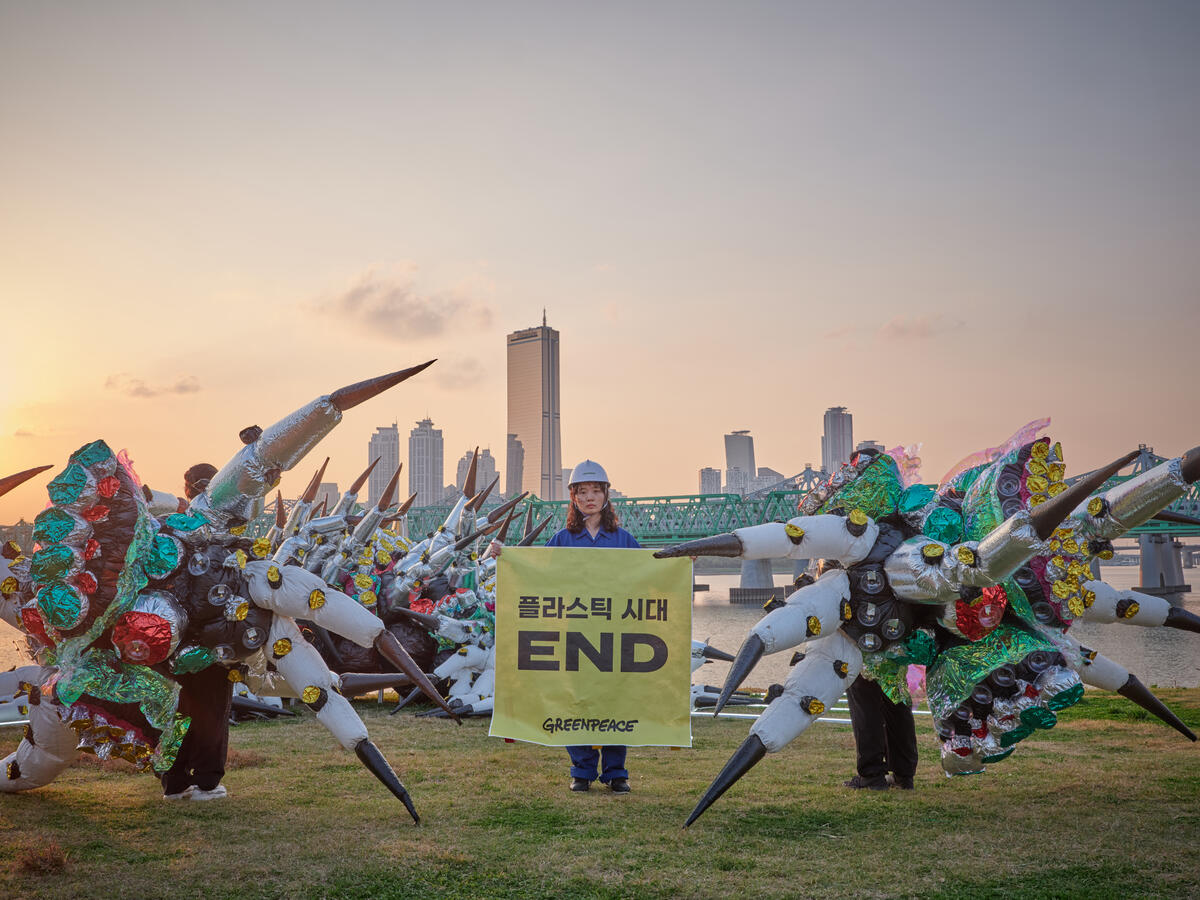 A giant plastic monster sculpture is installed by Greenpeace Seoul together with artist Byungchan Lee at the Han river park in Seoul. The activity is to call on the Korean government to take action and commit to support a stronger Global Plastics Treaty of 75% plastic reduction by 2040 ahead of the 3rd Intergovernmental Negotiating Committee (INC3) in Nairobi, Kenya on November 13th. © Jung-geun Augustine Park / Greenpeace
A giant plastic monster sculpture is installed by Greenpeace Seoul together with artist Byungchan Lee at the Han river park in Seoul. The activity is to call on the Korean government to take action and commit to support a stronger Global Plastics Treaty of 75% plastic reduction by 2040 ahead of the 3rd Intergovernmental Negotiating Committee (INC3) in Nairobi, Kenya on November 13th. © Jung-geun Augustine Park / Greenpeace4 things that the Plastics Treaty must do
Delegates preparing for negotiations in Canada must ensure the Plastics Treaty does four things: 1) cap and reduce plastic production; 2) end single-use plastics; 3) set reuse targets and accelerate a just transition towards reuse-based solutions; and, 4) ensure resources to support the delivery of the Treaty is aligned with the zero waste hierarchy. The treaty must also be rooted in a human rights-based approach, ensuring the rights of Indigenous Peoples are upheld, and the perspectives of frontline and other impacted communities, such as the waste picker community, are centered in discussions on solutions. Without countries working together to demand these elements are included, an effective treaty that succeeds in ending plastic pollution will be out of reach.
And we know the public agrees: a recent public poll from Greenpeace shows that over 80% of people around the world support a treaty that reduces plastic production, ends single-use plastics and accelerates reuse-based solutions.
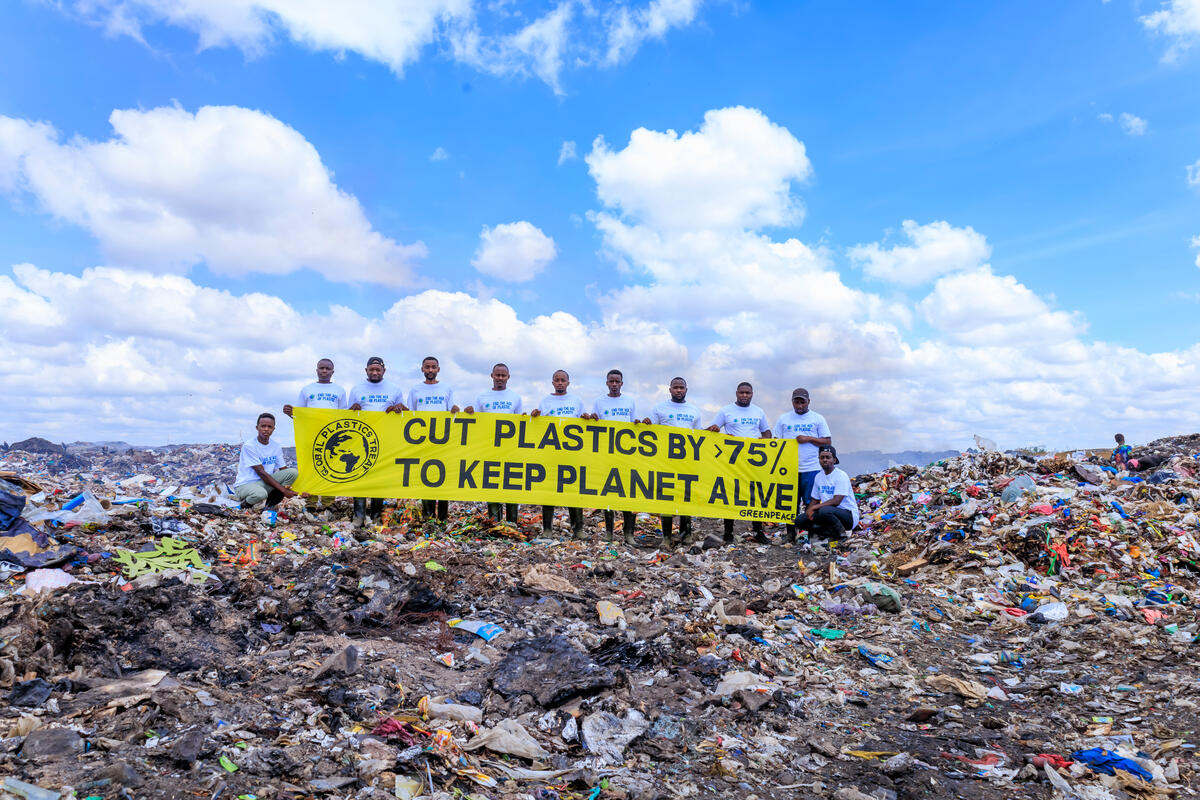 Greenpeace Africa volunteers with a banner reading “Cut Plastics by 75% to keep planet alive”, at the heart of the Dandora dumpsite in Kenya. As vast stretches of land are swallowed by discarded plastics, it underscores the urgency of our call: a reduction in plastic production by 75%. © Greenpeace / Selvin Marete
Greenpeace Africa volunteers with a banner reading “Cut Plastics by 75% to keep planet alive”, at the heart of the Dandora dumpsite in Kenya. As vast stretches of land are swallowed by discarded plastics, it underscores the urgency of our call: a reduction in plastic production by 75%. © Greenpeace / Selvin MareteOttawa can’t be known as the place where treaty negotiations went to die
So far, the negotiations have catered to low-ambition countries, including Saudi Arabia, Russia and Iran that have used procedural issues to prevent the rest of the world from moving forward. More than a hundred lobbyists from the fossil fuel industry piled on to stop negotiators from tackling the single most impactful thing the treaty must do – cap and reduce plastic production.
The last round of negotiations ended in abysmal failure. Everyone sitting in the plenary room at the United Nations compound on that final night in December felt shock, frustration, disappointment, and anger. For Ottawa to be different, negotiators must remember the feelings from Nairobi and channel that anger into action. The strategy of pandering to the lowest common denominator is clearly not working. Countries that are serious about protecting our health, the climate and biodiversity, must show renewed ambition and leadership.
Canada as the host country, Ecuador which takes over the chairmanship for INC-4, Norway and Rwanda as the Chairs of the High Ambition Coalition (HAC), and other members of the HAC must step up, organize, and advance the interests of people and the planet over backward-looking fossil fuel and petrochemical companies. Over 2.2 Million people around the world who have joined us in calling for a strong Global Plastics Treaty will be watching, as part of a growing movement working to end the age of plastic.
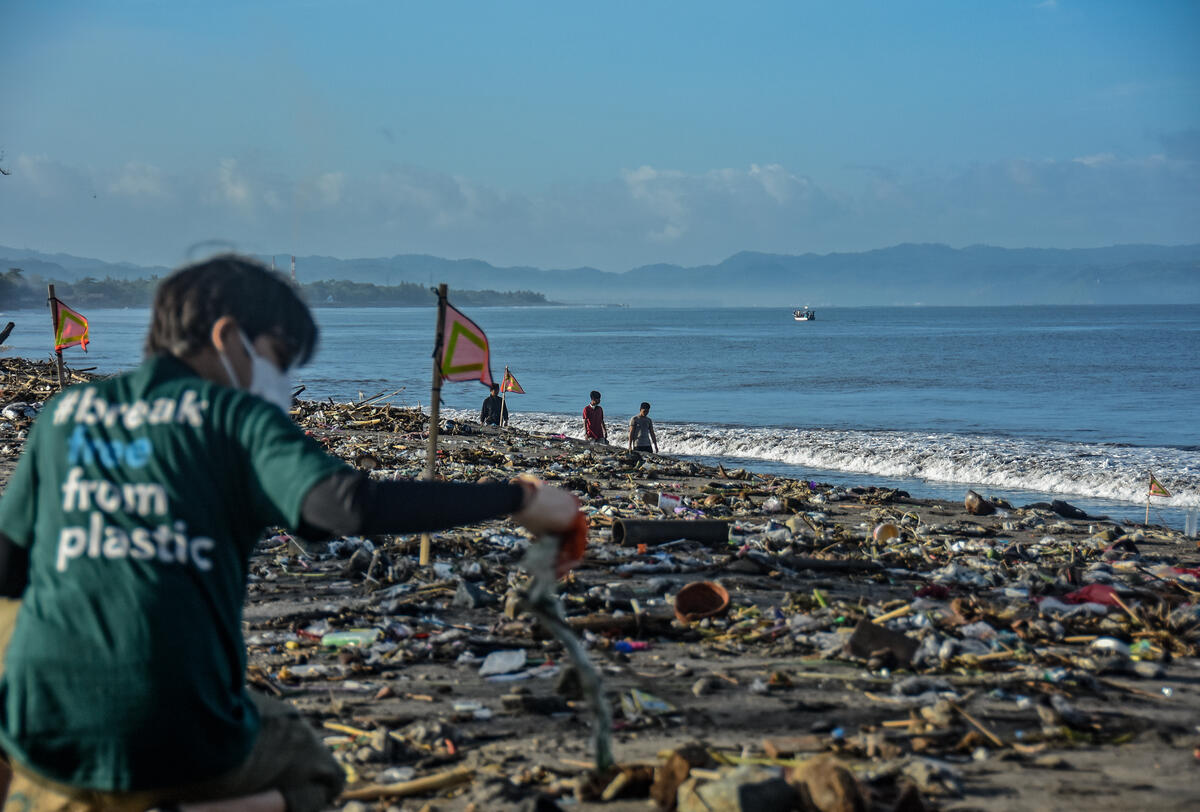 Greenpeace Indonesia holds a Beach Clean Up and Brand Audit activity at Loang Baloq beach in Mataram, Lombok Island, West Nusa Tenggara on Saturday, 29 October 2022. © Ahmad Subaidi / Greenpeace
Greenpeace Indonesia holds a Beach Clean Up and Brand Audit activity at Loang Baloq beach in Mataram, Lombok Island, West Nusa Tenggara on Saturday, 29 October 2022. © Ahmad Subaidi / GreenpeaceOttawa can’t be known as the place where treaty negotiations went to die, but if calls to action are heard, it could instead be known as the place where they began to thrive. So we are especially looking to Canada to set a tone that reflects the urgency and constructive optimism that is required to achieve an impactful treaty. Canada is well-positioned to get the talks back on track. To help rally global governments to put people over polluters. There is no time to waste.
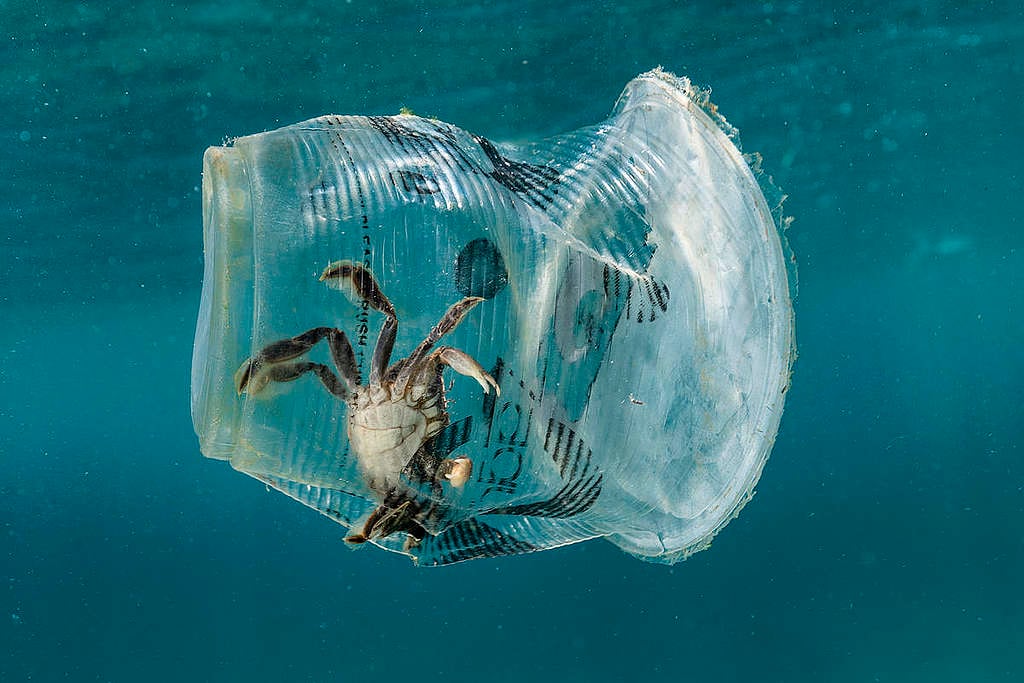
Ask world leaders to support a strong global plastic treaty that addresses the whole life cycle of plastic.
Graham Forbes is the Campaign Lead at Greenpeace USA and Sarah King is the Head of Plastics and Oceans Campaigns at Greenpeace Canada.

 1 week ago
29
1 week ago
29

